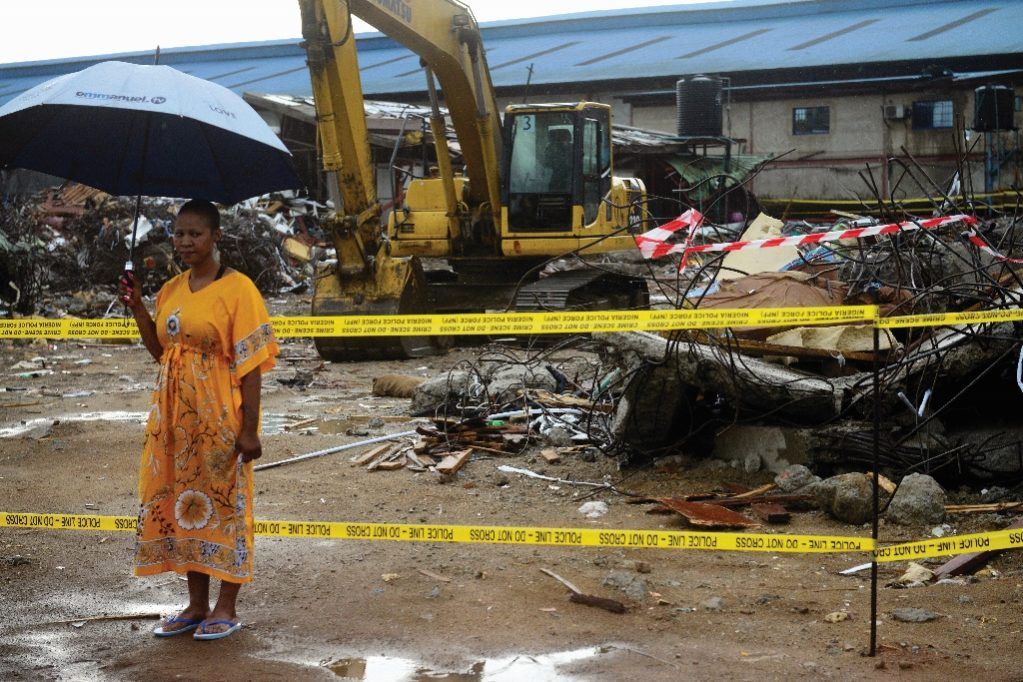For South Africa, September 12, 2014 will forever be remembered as a dark day. It was the day a collapsed church hostel in a densely-populated Lagos district brought sorrow, tears and grief to families across the country.
“I didn’t know what to expect, but I’m glad I saw her even though I couldn’t talk to her.”
These are the words of relief from Mantshebo Sefali that told the pain of many waiting to be reunited with family members that were caught in the chaos of a collapsed building in Lagos belonging to the Synagogue Church of All Nations (SCOAN).
Scores of relatives clustered at the Steve Biko Academic Hospital in South Africa’s capital Pretoria to get news about their injured family flown back from Nigeria. Some brought bouquets, others sat in the car park in stunned silence. Many couldn’t believe how a religious pilgrimage could end in tragedy.

Loading...
Inside the hospital, Lizzie Sefali lay unconscious. Doctors and nurses talked to the Sefali family before they were allowed inside. Mantshebo’s tears poured down as two aunts from her family stood up and embraced her. Mantshebo’s aunt, Thembi Khoza, had gone to the church with Lizzie.
They are just two of hundreds of Nigerians and South Africans who felt the pain following the collapse of the guest house that belonged to the church.
“My mother went with her sister to the church. My aunt usually goes every year, just for a week and this time she went with my mother,” says Sefali, a second year student studying tourism at the University
of Johannesburg.
About 115 people, 84 of them South Africans, reportedly died in the fatal accident, with more than 100, including Nigerians and citizens from other countries, sustaining serious injuries.
The deceased South Africans had gone on a pilgrimage to The Synagogue, as devotees usually refer to their church. Like many others before them from around the world who come to The Synagogue for spiritual rejuvenation, these South Africans hoped to return home hale and hearty. Instead, they will go back home in body bags, leaving officials of both nations in a diplomatic logjam and in search of an explanation for the building’s collapse.

“Not in the recent history of our country have we had this large number of our people die in one incident outside the country… The whole nation shares the pain of the mothers, fathers, daughters and sons who have lost their loved ones. We are all in grief,” says South Africa’s President Jacob Zuma.
The collapse reignited public debate on the sorry state of standards in the construction and urban planning sectors in Africa’s most populous nation. Rescuers and Nigeria’s National Emergency Management Agency say the hostel had been overburdened by the construction of additional floors. However, leader of SCOAN and popular televangelist, TB Joshua has his own theories of what happened. He claims the militant Islamic sect Boko Haram attacked his building, and later posted footage online of a low-flying aircraft ostensibly hovering above an uncompleted multi-storey building before it collapsed.
He is a charismatic preacher, counting presidents and prime ministers among his flock, giving him considerable political clout. Former Malawian head of state Joyce Banda once described Joshua as her spiritual father. He is believed to boost Nigeria’s tourism sector with disciples flocking to worship at The Synagogue from all over the world. The Synagogue, a massive eye-popping piece of real estate which seats about 15,000, is believed to be worth between $10 million and $15 million.
Joshua, a controversial figure dubbed The Prophet by his followers, claims to have foreseen the Malaysian Airlines MH17 plane crash, the Boston Marathon bombings and the results of Nigerian football matches. As the Lagos State Government issued a statement suggesting that the building was an illegal structure with defective structural works, many Nigerians have wondered why Joshua failed to foresee the collapse of his own building.
Loading...
